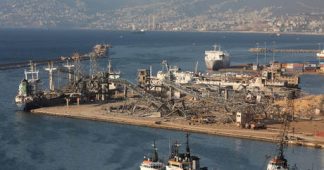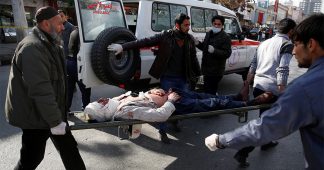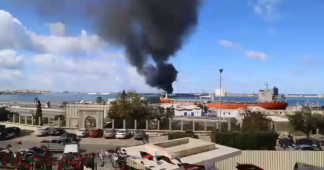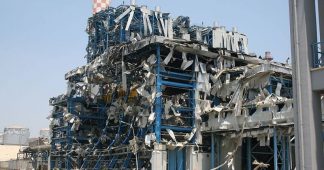Aug. 5, 2020
On August 4, a powerful explosion hit the port of Beirut. The blast wave virtually destroyed the port itself and caused terrible damage throughout Lebanon’s capital. The explosion killed more than 100 people and injured over 4,000, and the death toll is constantly increasing, many people are missing and the hospitals are overcrowded. The blast was the largest in the history of Lebanon. The international community, including even the State of Israel – the longtime enemy of Lebanon – has expressed its readiness to provide humanitarian assistance to the country.
The Lebanese Interior Ministry previously reported that a confiscated cargo of ammonium nitrate had detonated, which had been stored in a chemical warehouse in the port for further processing for destruction. The cargo was confiscated from a Moldovan vessel in 2014.
Negligence or subversion?
The media reports that the management of the Lebanese port had warned higher authorities about the danger of the ammonium nitrate cargo since 2014, but no action has been taken. As a result, six years later, the explosion destroyed the port itself and part of the city.
It is worth noting that this is not the first time in world history that the storage of a dangerous cargo in a port or other facility has resulted in a powerful explosion with numerous casualties. The explosion of 2100 tons of ammonium nitrate on the French ship Grandcamp, which led to numerous fires in the port of Texas City on April 16, 1947, killed at least 500 people. It is considered the worst industrial accident in American history.
World history witnessed other major disasters caused by ammonium nitrate explosions: for example, the explosion at BASF plant Oppau, Germany in 1921 (561 killed) and explosions in the Chinese port of Tianjin in 2015, when 173 people were killed.
On the other hand, the deadliest American domestic terrorist Timothy McVeigh used ammonium nitrate to attack Oklahoma City in 1995, when 168 people were killed.
According to the current theory, the fire and explosion were the result of welding work carried out in the warehouse. However, it remains to be seen whether this was a result of negligence or sabotage by those who knew that the deadly cargo was being stored in the port.
Lebanese authorities have not yet said anything about the blast being the result of a terrorist attack. However, US President Donald Trump has already stated that in his opinion, this is some kind of “attack”.
“I’ve met with some of our great generals and they just seemed to feel that it was,” Trump said. “This was not some kind of a manufacturing explosion type of event… They would know better than I would, but they seem to think it was an attack – it was a bomb of some kind, yes.”
Although unnamed Pentagon officials rushed to refute CNN’s statement, Trump’s statement is worrying.
Israel, which often bombs Syria and Lebanon and is usually suspected of sabotage in the region, has hastened to declare that it had nothing to do with the explosion.
Al-Jazeera TV reported that the Israeli army was ready to send troops “to help” in the rescue operations ongoing in Beirut.
Economic and political shock
By various estimates, up to 200-250,000 people lived in the area affected by the explosion. The number of victims is huge and this number is constantly increasing. Damage from the explosion at the port of Beirut is estimated at $3-5 billion. According to initial estimates, only 3% of the port capacity of Beirut remains.
The capital of Lebanon and the country as a whole has suffered enormous economic damage. The port of Beirut accounted for 75% of the country’s exports and imports. Lebanon, which is in economic crisis, will find it extremely difficult to recover from this blow without serious international assistance. The explosion destroyed the port’s elevator, which housed the entire wheat supply for the city. In addition, the entire stock of medicine was destroyed.
The residents of the city are facing the prospect of a humanitarian disaster.
It is also worth noting that Lebanon is under American sanctions because of the ties between the government and Hezbollah, which is part of a coalition that supports the current government. Since last year, the country has been shaken by protests supported from abroad.
One of the protesters was the pro-Western and pro-Israeli party Kataeb, representing Lebanese Maronite Christians. Its Secretary, General Nazar Najarian, was killed in the explosion. This fact can be used to further deepen the political crisis in Lebanon by external actors, amidst social and economic shock.
The government will be blamed for inaction and criminal negligence as well as the difficult economic situation. The desire to blame the elites may lead to new waves of protest in Lebanon. Against this background, Iran’s opponents in the region will try to put the blame on Hezbollah one way or another.
The Lebanese authorities are trying to preempt and prevent such a scenario. To maintain order in the country, Lebanese Prime Minister Hassan Diab declared a state of emergency for two weeks. The Lebanese Army will be responsible for maintaining internal order. The Prime minister also called on Lebanese factions to abandon disagreements for the time being.
A strange coincidence
It is indicative that on the day of the explosion, information started to spread in social networks that a second explosion allegedly took place near the residence of the former Prime Minister Saad Hariri.
The trial for the assassination of his father, Rafic Hariri, also former Lebanese Prime Minister from 2000 to 2004, is scheduled to take place on August 7. The politician was killed in a terrorist attack in 2005. Saudi Arabia, which supported senior and junior Hariri, accused Iran and Hezbollah of the murder.
A coincidence, maybe, but still significant, in that it shows that Lebanon as a country is essentially a powderkeg.
The day before the Beirut Explosion, Lebanese Foreign Minister Nassif Hitti, a diplomat who had good relations with the Gulf States, Europe and the United States, resigned from his post.
“Lebanon today is slipping into a failed state,” he said when announcing his resignation.
Thus, the blasts coincided with the new wave of political crisis in Lebanon. The explosions could lead to increased tensions in Lebanese society, where different political and sectarian groups would blame each other, leading to an outbreak of civil conflict.
Theoretically, the intelligence services of the US, Israel, or the Gulf states could have been involved in the attack. The only big surprise is the scale of the tragedy.
It is also suspicious that the American military transport aircraft Boeing C-17A arrived at Beirut airport a few hours before the explosion. Another NATO aircraft flew off almost simultaneously with the explosions.
It is also interesting that before the tragedy in Beirut, mysterious blasts and fires hit Iran, Israel being the main suspect.
Given the deteriorating economic and security situation in Lebanon, the tragic explosion is perfectly timed for the initiating a new wave of violence in the region.
Geopolitical context
A week before the explosion, Lebanese Prime Minister Hassan Diab accused Israel of “dangerous escalation” on its southern border. According to the Lebanese Prime Minister, the goal of a Zionist state in southern Lebanon was to expand powers of a UN peacekeeping force (UNIFIL).
Israel in turn said that Hezbollah fighters tried to infiltrate Israeli territory, which led to a shootout at the border. Locals accuse Israel of initiating attacks that led to the response of Hezbollah.
“We will continue to take action to thwart Iran’s military entrenchment in our region,” he said. “We will do whatever is necessary to defend ourselves,” Israeli Prime Minister Benjamin Netanyahu said the day before the tragedy in Beirut.
The mandate of the UN peacekeeping force should be extended by the UN at the end of August. Given the difficult situation in the country, one should hardly expect that after the bombings in Beirut, the UN will renounce its presence in Lebanon.
It is possible that the UN forces will be given new powers, which may become a reason for the consolidation of foreign intelligence services and military in the region under the pretext of fighting the disaster and providing economic assistance to the country.
Lebanon now has no choice but to accept foreign aid, in exchange for which the leadership may be asked for geopolitical concessions. Only international institutions like the IMF and the Gulf monarchy – the UAE and Saudi Arabia – can be serious financial donors.
This will lead to Lebanon’s total dependence on the US, global financial centers and Wahhabi monarchies of the Persian Gulf. Whatever the cause of the explosion in Beirut, it will objectively benefit the U., Israel, Saudi Arabia and the UAE.
They will strengthen their positions and try, by putting pressure on Lebanon through their networks of influence, by raising protests and promising help, all in order to stop Hezbollah’s activities and to destroy a key link in the “Shiite crescent” that provides Iran’s access to the Mediterranean Sea through Syria and Iraq.
Published at https://uwidata.com/13027-who-stands-to-benefit-from-the-beirut-explosion/











